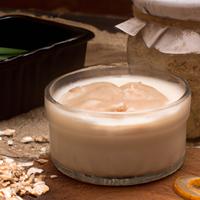
1 serving (15 grams) contains 30 calories, 0.5 grams of protein, 2.5 grams of fat, and 2.0 grams of carbohydrates.

Log this food in SnapCalorie

Nutrition Information
Calories |
476.2 | ||
|---|---|---|---|
% Daily Value* |
|||
| Total Fat | 39.7 g | 50% | |
| Saturated Fat | 7.9 g | 39% | |
| Polyunsaturated Fat | 0 g | ||
| Cholesterol | 0 mg | 0% | |
| Sodium | 158.7 mg | 6% | |
| Total Carbohydrates | 31.7 g | 11% | |
| Dietary Fiber | 0 g | 0% | |
| Sugars | 0 g | ||
| protein | 7.9 g | 15% | |
| Vitamin D | 0 mcg | 0% | |
| Calcium | 0 mg | 0% | |
| Iron | 0 mg | 0% | |
| Potassium | 0 mg | 0% | |
* Percent Daily Values are based on a 2,000 calorie diet. Your daily values may be higher or lower depending on your calorie needs.
Food Attributes
Source of Calories
About Oatcream
Oatcream is a creamy, plant-based alternative to dairy cream made primarily from oats, water, and oils, often supplemented with emulsifiers and stabilizers for texture. Originating as part of a broader movement toward sustainable, non-dairy foods, oatcream is especially popular in Scandinavian and vegan cuisines. It is lower in saturated fat compared to traditional cream, making it a heart-healthier option, and contains dietary fiber from oats, which supports digestion. Many oatcream varieties are fortified with vitamins like B12 and D to cater to dietary gaps in plant-based diets. However, it's worth noting that commercial oatcreams may contain added sugars, preservatives, or artificial flavorings, depending on the brand. Ideal for soups, sauces, desserts, and coffee, oatcream provides a versatile creamy richness without the lactose, offering an inclusive choice for vegan or dairy-sensitive individuals. Always check the label for nutritional specifics.



